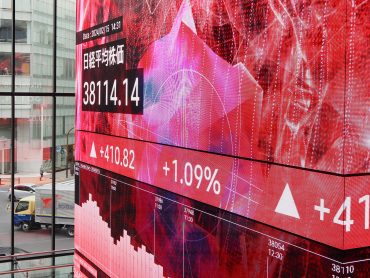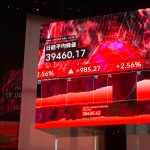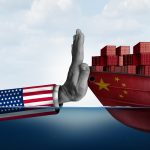
- BOJ
- Global Markets
- Nikkei
Nikkei Falls 1% as Markets Await Bank of Japan Decision
5 minute read

Asian stock markets anticipate Bank of Japan’s policy decision as tech companies shift manufacturing away from China
Key Takeaways
- Nikkei drops 1% ahead of BoJ rate decision as Asian markets show mixed performance while investors await Thursday’s policy announcement and assess US-Japan trade deal impacts.
- US tech giants accelerate China diversification with Apple expanding to India, Vietnam, and Malaysia, while Nvidia announces $500 billion US AI chip investment amid tariff pressures.
- Samsung surges 3% on $16.5 billion Tesla chip deal as semiconductor sector becomes strategic flashpoint in US-China tech tensions, with venture capital investment jumping 47% year-over-year.
Introduction
Asian stock markets struggle for direction at the start of a busy week, with the Nikkei index slipping ahead of the Bank of Japan’s rate decision. Japan’s benchmark index falls 1% from recent one-year highs as investors brace for Thursday’s monetary policy announcement and assess the implications of last week’s US-Japan trade agreement.
The cautious sentiment reflects broader uncertainty across regional markets as the August 1 US tariff deadline approaches. Hong Kong leads regional gains amid optimism over the US-EU trade framework deal, while Chinese markets pare early gains to trade slightly lower.
Key Developments
The Bank of Japan is expected to maintain its policy rate at 0.5% during Thursday’s meeting, though analysts anticipate potential shifts in economic forecasts following the US trade deal. The central bank may offer less pessimistic guidance, with rate hikes potentially resuming later in 2025.
Major US tech companies are accelerating manufacturing diversification efforts away from China in response to escalating trade tensions. Apple expands assembly operations across India, Vietnam, and Malaysia, while other technology giants implement similar “China+1” strategies to reduce geopolitical exposure.
Top US and Chinese officials are scheduled to meet in Stockholm to resolve trade tensions and reportedly seek a three-month extension of their tariff truce before the August 12 expiration. The discussions come as both sides look to prevent further escalation in commercial disputes.
Market Impact
Japan’s Nikkei 225 drops 1% to below 41,300, with the broader TOPIX index falling 0.5%. Notable decliners include semiconductor stocks, with Advantest plunging 7.6% and Tokyo Electron retreating 2.4%. According to Investing.com, most Asian markets post only slight moves as investors remain cautious ahead of the tariff deadline.
Hong Kong’s Hang Seng index trades 0.5% higher after jumping over 1% in early sessions, while Chinese markets show mixed performance. The Shanghai Composite index falls 0.2%, and the Shanghai Shenzhen CSI 300 also declines 0.2%.
South Korea’s KOSPI remains largely unchanged, though Samsung rises more than 3% following announcement of a $16.5 billion chip supply deal with Tesla. Australia’s S&P/ASX 200 gains 0.3%, while Singapore’s Straits Times Index edges 0.2% lower.
Strategic Insights
The semiconductor sector emerges as a critical battleground in US-China technology competition. US policies like the CHIPS Act aim to boost domestic chip production, while Chinese firms accelerate development of alternative technologies in response to restrictions.
Nvidia’s $500 billion investment in US-based AI chip manufacturing represents a dramatic shift toward domestic production capabilities. Intel similarly expands US manufacturing capacity, though full implementation requires years of development and substantial capital investment.
Cross-border investment in sensitive technologies drops approximately 35% since 2022 as firms and investors exercise greater caution. Market volatility increases significantly, with new tech restrictions or tariff policies triggering price swings of up to 15% in affected sectors.
Expert Opinions and Data
ING analysts note that the US-Japan trade deal removes significant uncertainty for monetary policy decisions. “Given the US-Japan trade deal struck this week, a big uncertainty factor has been removed. This could offer some relief for the BoJ,” they state.
The analysts add that “possible upward revisions of inflation forecasts should offer markets hints about the near-term rate outlook.” Their assessment suggests the central bank may adopt a more optimistic stance on economic recovery prospects.
Venture capital investment in semiconductor startups grows 47% year-over-year in 2024, reflecting heightened investor interest in technology sovereignty solutions. Trading Economics forecasts suggest the Nikkei may trade at 39,934.79 points by quarter-end and 35,697.96 in twelve months.
Conclusion
Asian markets face a complex backdrop of monetary policy uncertainty, trade negotiations, and structural shifts in global technology supply chains. The Nikkei’s decline ahead of the BoJ decision reflects investor caution as major economies navigate competing pressures from inflation management and geopolitical tensions.
Technology sector restructuring continues to accelerate as companies implement comprehensive diversification strategies. The combination of policy support for domestic manufacturing and ongoing trade negotiations creates both opportunities and challenges for regional markets in the coming months.








